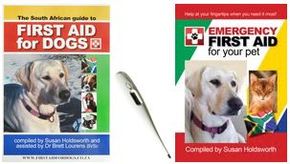|
Most owners are concerned with their dog’s health, maintaining a correct diet, suitable exercise, regular trips to the vet for check ups and a good grooming routine. But they often overlook a very important aspect – the dog’s teeth! Dental hygiene should be one of the most important roles in our responsibility as owners.
Veterinary care should include periodic dental checks which is important to maintain good oral health. Pets with healthy gums and teeth will be happier, healthier and have more energy.
Your dog’s teeth should receive oral care in the form of regular brushing with an approved canine toothpaste. Never use toothpaste designed for humans as this will make your dog sick. Start by using your finger, and rub gently across his teeth and gums, so that the dog can get used to the flavour of the toothpaste and the attention you are paying to the inside of his mouth. Congratulate him all the time and make it a fun event. Alternatively, dog “chews” can maintain the teeth in a healthy condition. Feeding a good quality dry food diet will also promote healthy teeth and gums. Human food and treats tend to cause dental problems for dogs.
Diagnosing dental problems early will help avoid severe dental disease. Plaque builds up between the teeth and turns into tartar or calculus. These areas encourage the growth of bacteria which erodes the teeth and causes infection in the gums. This bacteria can also affect other parts of the body possibly resulting in heart valve, liver and kidney damage.
SYMPTOMS TO LOOK FOR:
- Bad and smelly breath
- Red or puffy gums
- Reluctance to chew food
- Change in eating habits
- Bleeding gums
- Increased salivation
- Yellow and discoloured teeth
- Loose or missing teeth
- Pawing at the mouth
- Swelling / abcess under the eye or in the muzzle (carnassial tooth abcess)
It is advisable to have your dog’s teeth checked during the annual health check at the veterinarian. The veterinarian may decide to clean or remove diseased teeth. This life saving procedure will be done under sedation or a full anesthesia. Many dogs gain a new lease on life after a thorough dental scaling and removal of diseased teeth
This article is copyrighted and remains the property of the author. Individuals are welcome to print or copy same for their own use in furthering their knowledge of dogs. However, no reproductions or alterations/variations are allowed without the express written consent of the author.

